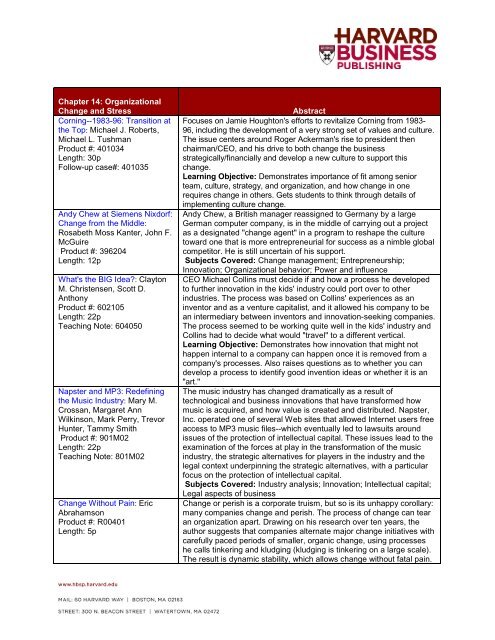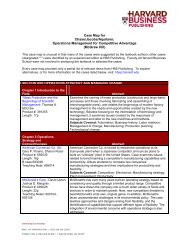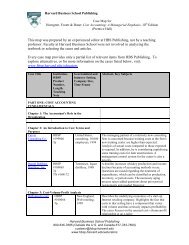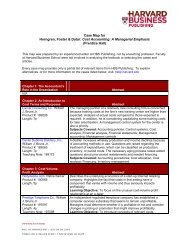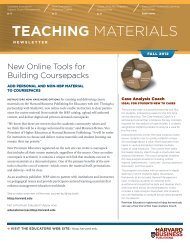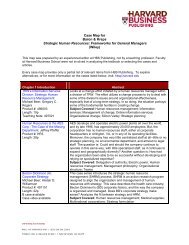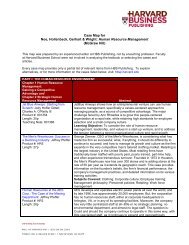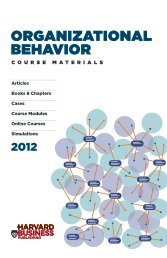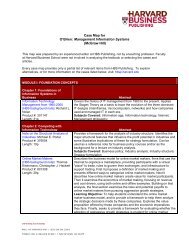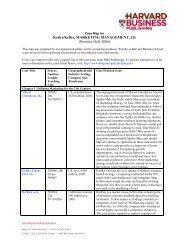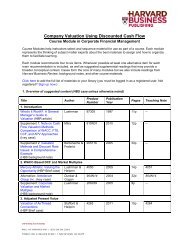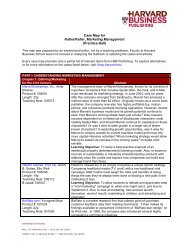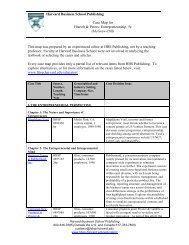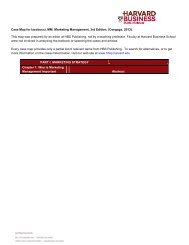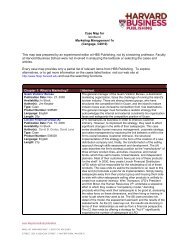Case Map for Certo: Modern Management - Harvard Business ...
Case Map for Certo: Modern Management - Harvard Business ...
Case Map for Certo: Modern Management - Harvard Business ...
You also want an ePaper? Increase the reach of your titles
YUMPU automatically turns print PDFs into web optimized ePapers that Google loves.
Chapter 14: Organizational<br />
Change and Stress<br />
Corning--1983-96: Transition at<br />
the Top: Michael J. Roberts,<br />
Michael L. Tushman<br />
Product #: 401034<br />
Length: 30p<br />
Follow-up case#: 401035<br />
Andy Chew at Siemens Nixdorf:<br />
Change from the Middle:<br />
Rosabeth Moss Kanter, John F.<br />
McGuire<br />
Product #: 396204<br />
Length: 12p<br />
What's the BIG Idea?: Clayton<br />
M. Christensen, Scott D.<br />
Anthony<br />
Product #: 602105<br />
Length: 22p<br />
Teaching Note: 604050<br />
Napster and MP3: Redefining<br />
the Music Industry: Mary M.<br />
Crossan, Margaret Ann<br />
Wilkinson, Mark Perry, Trevor<br />
Hunter, Tammy Smith<br />
Product #: 901M02<br />
Length: 22p<br />
Teaching Note: 801M02<br />
Change Without Pain: Eric<br />
Abrahamson<br />
Product #: R00401<br />
Length: 5p<br />
Abstract<br />
Focuses on Jamie Houghton's ef<strong>for</strong>ts to revitalize Corning from 1983-<br />
96, including the development of a very strong set of values and culture.<br />
The issue centers around Roger Ackerman's rise to president then<br />
chairman/CEO, and his drive to both change the business<br />
strategically/financially and develop a new culture to support this<br />
change.<br />
Learning Objective: Demonstrates importance of fit among senior<br />
team, culture, strategy, and organization, and how change in one<br />
requires change in others. Gets students to think through details of<br />
implementing culture change.<br />
Andy Chew, a British manager reassigned to Germany by a large<br />
German computer company, is in the middle of carrying out a project<br />
as a designated "change agent" in a program to reshape the culture<br />
toward one that is more entrepreneurial <strong>for</strong> success as a nimble global<br />
competitor. He is still uncertain of his support.<br />
Subjects Covered: Change management; Entrepreneurship;<br />
Innovation; Organizational behavior; Power and influence<br />
CEO Michael Collins must decide if and how a process he developed<br />
to further innovation in the kids' industry could port over to other<br />
industries. The process was based on Collins' experiences as an<br />
inventor and as a venture capitalist, and it allowed his company to be<br />
an intermediary between inventors and innovation-seeking companies.<br />
The process seemed to be working quite well in the kids' industry and<br />
Collins had to decide what would "travel" to a different vertical.<br />
Learning Objective: Demonstrates how innovation that might not<br />
happen internal to a company can happen once it is removed from a<br />
company's processes. Also raises questions as to whether you can<br />
develop a process to identify good invention ideas or whether it is an<br />
"art."<br />
The music industry has changed dramatically as a result of<br />
technological and business innovations that have trans<strong>for</strong>med how<br />
music is acquired, and how value is created and distributed. Napster,<br />
Inc. operated one of several Web sites that allowed Internet users free<br />
access to MP3 music files--which eventually led to lawsuits around<br />
issues of the protection of intellectual capital. These issues lead to the<br />
examination of the <strong>for</strong>ces at play in the trans<strong>for</strong>mation of the music<br />
industry, the strategic alternatives <strong>for</strong> players in the industry and the<br />
legal context underpinning the strategic alternatives, with a particular<br />
focus on the protection of intellectual capital.<br />
Subjects Covered: Industry analysis; Innovation; Intellectual capital;<br />
Legal aspects of business<br />
Change or perish is a corporate truism, but so is its unhappy corollary:<br />
many companies change and perish. The process of change can tear<br />
an organization apart. Drawing on his research over ten years, the<br />
author suggests that companies alternate major change initiatives with<br />
carefully paced periods of smaller, organic change, using processes<br />
he calls tinkering and kludging (kludging is tinkering on a large scale).<br />
The result is dynamic stability, which allows change without fatal pain.


